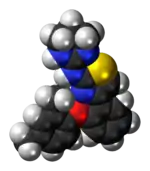Abafungin
Abafungin (INN) is a broad-spectrum antifungal agent with a novel mechanism of action for the treatment of dermatomycoses.
 | |
 | |
| Clinical data | |
|---|---|
| Trade names | Abasol |
| Routes of administration | Topical (cream) |
| ATC code |
|
| Identifiers | |
| |
| CAS Number | |
| PubChem CID | |
| DrugBank | |
| ChemSpider | |
| UNII | |
| ChEBI | |
| ECHA InfoCard | 100.125.129 |
| Chemical and physical data | |
| Formula | C21H22N4OS |
| Molar mass | 378.49 g·mol−1 |
| 3D model (JSmol) | |
| |
| |
| | |
Abasol is a topical cream formulation of abafungin by York Pharma.[1]
History
Abafungin was first synthesized at Bayer AG, Leverkusen, Germany. A study of H2-antagonists related to famotidine, resulted in the discovery of its antifungal properties.[2]
Its development seems to have been discontinued in 2009.[3]
Mechanism of action
Unlike imidazole- and triazole-class antifungals, abafungin directly impairs the fungal cell membrane.[2]
In addition, abafungin inhibits the enzyme sterol 24-C-methyltransferase, modifying the composition of the fungal membrane.[4]
Abafungin has antibiotic activity against gram-positive bacteria as well as sporicidal activity.[5]
References
- "Regulatory Update – Abasol" (PDF). York Pharma. Archived from the original (PDF) on September 27, 2007.
- Borelli C, Schaller M, Niewerth M, Nocker K, Baasner B, Berg D, et al. (August 2008). "Modes of action of the new arylguanidine abafungin beyond interference with ergosterol biosynthesis and in vitro activity against medically important fungi". Chemotherapy. 54 (4): 245–59. doi:10.1159/000142334. PMC 2818358. PMID 18587237.
- "Abafungin". AdisInsight. Retrieved 5 May 2021.
- Ruiz-Ortega M, González S, Serón D, Condom E, Bustos C, Largo R, González E, Ortiz A, Egido J (December 1995). "ACE inhibition reduces proteinuria, glomerular lesions and extracellular matrix production in a normotensive rat model of immune complex nephritis". Kidney International. 48 (6): 1778–91. doi:10.1038/ki.1995.476. PMID 8587237.
- Ginter-Hanselmayer G (March 2009). Arbeitsunterlagen zur 42. wissenschaftlichen Fortbildungsveranstaltung für Apothekerinnen und Apotheker: Infektionskrankheiten. Österreichische Apothekerkammer. p. 103.